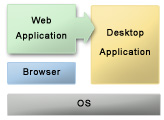
Google announced its plan to “hire a couple of folks to help make OpenOffice better”. This is pretty exciting!!! I am a big fan of OpenOffice, both the product and the people behind it. I had the privilege to meet them, and it is always refreshing to see a group of talented developers so dedicated to their goals. I really hope this partnership will be very productive. And, I am sure this help is very welcome from the OpenOffice team.
One thing I have always wished for is to get from OpenOffice functions that I cannot get from Microsoft Office. OpenOffice does a good job at providing similar functionality as Microsoft Office. However, while OpenOffice provides innovation and modern functionality, it does not provide much more than Microsoft Office, at least not in a "Web 2.0" sense.
For example, in nowadays, most Web Applications (such as Flickr, Blog Service, Wikis, …) offer some powerful Web services. It would be useful to integrate these services directly into the OpenOffice editing experience. Here are a couple of features I would love to see in OpenOffice:
- Use OpenOffice Writer as [super] blog publishing tool (for WordPress, Bloggers, and TypePad).
- Use Flickr or any other photo services directly into Writer, Impress or even Calc., basically, being able to search and insert images from any photo services (i.e. ‘a la Flock‘) while editing my document.
- Use any blog and Wiki services as a data source for Writer and Impress. For example, while writing a document or presentation, having the ability to quote a section of a blog or Wiki page (e.g., Wikipedia).
- Many other possible integrations exist.
I am sure the OpenOffice platform and architecture allows for such extensions. It would also be great to include some of these integrations in the default OpenOffice package … just to stimulate engineering creativity and to offer a good reason to use OpenOffice even if we still have to use Microsoft Office, at least for a while ;).

 I am in a quest for a good blog editor. I have some requirements, but I am faily flexible at this point. So, my first attempt will be with
I am in a quest for a good blog editor. I have some requirements, but I am faily flexible at this point. So, my first attempt will be with